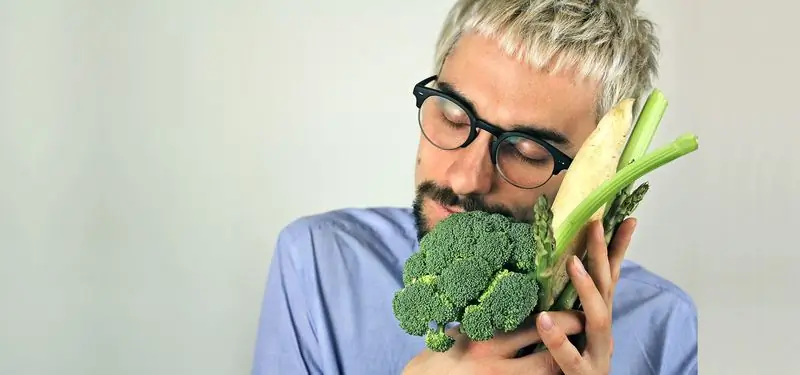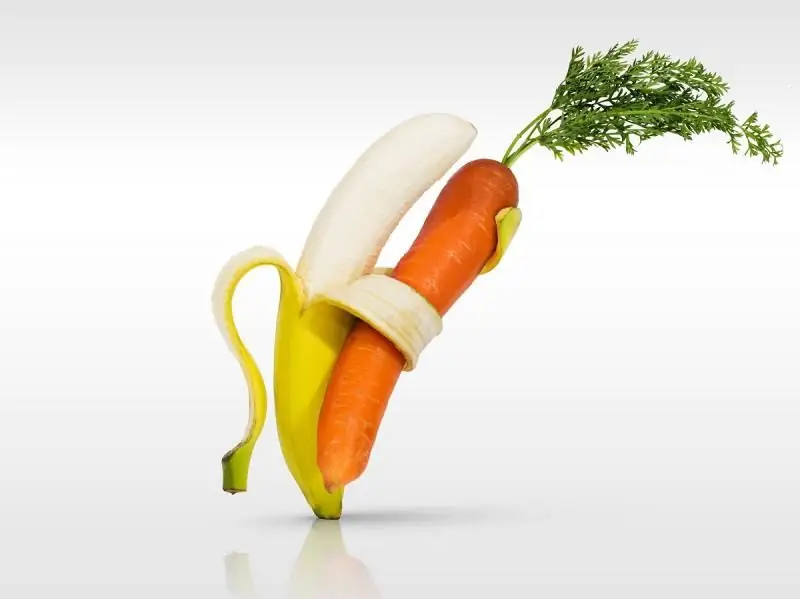
Table of contents:
- Author Bailey Albertson albertson@usefultipsdiy.com.
- Public 2024-01-17 22:26.
- Last modified 2025-01-23 12:41.
Why veganism has become popular: a new fashion or a path to health and longevity?

The trend towards veganism and vegetarianism, which has become fashionable and formed several years ago, has already captured the minds of not only famous businessmen, politicians and cultural figures, but also ordinary people. The stories of the miraculous deliverance from incurable diseases, the harmony of the once magnificent bodies and other qualitative improvements in life, broadcast from TV screens and pages of glossy magazines, are sometimes so convincing that it is hard not to believe in them. I would like to follow the example, test my body and finally solve the accumulated problems once and for all. However, not all so simple. The popular trend has a downside. Let's figure out what the essence of the concept is and whether it is really useful for our health.
Content
-
1 How it all started: the reasons for the popularity of veganism in the USA
1.1 Photo Gallery: Famous Vegetarians and Vegans of the World
-
2 The distant past and the popularity of veganism in Russia
- 2.1 Photo Gallery: Famous Vegetarians of the Past
- 2.2 Video: Channel "Russia 24" on the sensational discovery of WHO
-
3 The concept of vegetarianism: 7 insidious beliefs
- 3.1 Meat is heavy food
- 3.2 Vegans Live Longer
- 3.3 Improving digestion and functioning of the gastrointestinal tract
- 3.4 Plant foods also contain protein
- 3.5 Vegans are not poisoned by toxins
- 3.6 Vegetarians are never fat
- 3.7 Have pity on animals
How it all started: the reasons for the popularity of veganism in the USA
It all began back in 2005 with the publication of The China Study by Colin Campbell (titled professor of food biology at Cornell University) and his son Thomas Campbell, a medical doctor. The genre of the book is non-fiction. The plot is based on real research carried out by three of the world's leading universities: Cornell, Oxford and the Chinese Academy of Preventive Medicine. The research itself lasted for 20 years and was unprecedented in scale.
The object of the study was the correlation dependence of mortality from any of the 48 types of cancer on dietary preferences. The study was conducted in 68 counties in China with genetically homogeneous populations, low migration rates and static eating habits. A total of 6800 people were studied (100 from each district). Moreover, the level of consumption of products of animal origin varied significantly from district to district. In his book, Colin Campbell states the impact of the consumption of animal products on the frequent deaths from cancer and other common "diseases of the West": diabetes, stroke and others.

Colleen Campbell and his son, Thomas Campbell, are the authors of Exploring China

Study of China changed the minds of ordinary Americans
Photo gallery: famous vegetarians and vegans of the world
-

Henry Ford - Henry Ford believed that the world would be much better if a person stopped eating meat
-

Christine Lagarde - One of the most powerful women in politics - Christine Lagarde - strictly follows a vegetarian diet, limiting herself to vegetables, fruits and avoiding meat dishes without problems
-

Josh Tetrick - Josh Tetrick is not just a vegetarian, but also the founder of Hampton Creek Foods, an organic vegetable substitute for eggs and mayonnaise.
-

Steve Jobs -
The creator of the "world of gadgets" Steve Jobs was a strict Fruitarian during his work at Apple.
-

Stephen Chan Chi-Wan - One of Asia's largest media moguls Stephen Chan Chi-Wan became a vegetarian with one goal in mind - to finally lose weight
-

Pavel Durov - Pavel Durov has long given up on meat and believes that there are no secrets and cunning diets for the new nutrition system - natural food, fruits, vegetables, water.
-

Alfred Ford - Alfred Ford, the great-grandson of the legendary Henry Ford, inherited not only his ancestor's empire, but also a vegetarian diet
-

Bill clinton -
Bill Clinton, 42nd President of the United States, switched to a plant-based diet to stay healthy
-

Paul McCartney - Sir James Paul McCartney is not only giving charity concerts and following a vegetarian diet, but also becoming an environmentalist
-

Amitabh Bachchan - Amitabh Bachchan, one of the most popular Bollywood actors, was born into a traditional Indian family, so he was a vegetarian since childhood
-

Bob Dylan - Bob Dylan is a singer, musician and poet, winner of the 2016 Nobel Prize for Literature and a member of the Vegetarian Society of Australia
-

Carl Lewis - Carl Lewis - track and field athlete, multiple world champion, owner of 9 Olympic gold medals - explains his success by regular training and refusal of animal food
-

Mike Tyson - Mike Tyson - a boxer who needs no introduction - came to vegetarianism after the end of his sports career
-

Martina Navratilova - Martina Navratilova - world famous tennis player - is not only a staunch vegetarian, but also an activist of PETA - an organization that fights for animal rights
-

Brad Pitt - Brad Pitt has completely abandoned meat and animal products since the early 2000s.
-

Pamela Anderson - Pamela Anderson - actress and TV presenter, famous vegetarian and animal rights activist
The distant past and the popularity of veganism in Russia
In fairness, I must say that the refusal of food of animal origin was not invented by the Americans. Long before it became mainstream, in our country, the refusal of meat products was offered in numerous Buddhist, Hindu and Jain centers that opened after the collapse of the USSR. The religions themselves have practiced vegetarianism for millennia. For example, yoga, which has long been familiar to everyone from physical exercises (the correct name is hatha yoga), is only part of the religious trend. The philosophical component of yoga (bhakti yoga) is similar in traditions and spiritual culture to Buddhism and Hinduism, and the first requirement is “no harm is nonviolence,” which is regarded, in particular, as the use of plant foods.
Our compatriot Leo Tolstoy was also a great humanist, who became one of the first in our country to adhere to vegetarianism. It is believed that his influence played a significant role in the development of the vegetarian movement in Russia at the end of the 19th century.
Photo Gallery: Famous Vegetarians of the Past
-

Pythagoras - There is an opinion that Pythagoras of Samos, an ancient Greek philosopher, mathematician and mystic, was a vegetarian.
-

Leonardo da Vinci - The famous inventor and artist Leonardo da Vinci explained the rejection of meat with humanistic views
-

Albert Einstein - Prominent physicist and Nobel laureate Albert Einstein was a staunch vegetarian in adulthood, and a few months before his death became a vegan
-

Lev Tolstoy - Lev Tolstoy is a famous humanist and one of the first vegetarians in Russia
-

Vegetarian canteen - Vegetarian canteen in Moscow on Nikitsky Boulevard
However, the real boom of veganism began in our country only in 2013, after the release of the translation of the book by Colin Campbell. Publishing house "Mann, Ivanov and Ferber", which released the Russian version under the name "China Study", in the accompanying preface speaks very enthusiastically about the main idea and expresses a desire for as many people as possible to read the book and start acting. True, in the same preface it is noted that the publishing house does not guarantee the effectiveness of the method and, generally speaking, is not entirely sure that "a universal remedy has been found", but calls on: "Why not try it?" That's it, the trigger is pulled, Jin is released from the bottle. And what Russian does not dream of a "magic pill"?
A new round starts in October 2015 after the publication of a sensational report by the World Health Organization. According to the research results, 22 experts from 10 countries stated that eating unprocessed red meat (pork, beef, lamb) and especially meat products made from it (sausages, sausages, ham) leads to the occurrence of cancer. In general, initially it was about the development with a probability of 18% only of rectal cancer and, possibly, with a significantly lower probability of prostate cancer and pancreatic cancer. Moreover, subject to the daily use of a 50-gram portion. But the words “possibly”, “every day” and the figure “18%” somehow quickly faded into the background. And now despatches are flying, the headings of articles cover each other: MEAT - CANCER. Direct dependency. 100%. No options. Against this background, the opinion of modest nutritionists and oncologists, who believe that the harm is not so much from the meat itself, but from substances, does not count at all,giving it a marketable appearance (nitrites, converting into nitrosamines - the strongest carcinogens). Psychologists are completely sure that meat is not so much harmful as talking about it. A person who knows about the dangers of a product, but continues to eat it, is much more likely to suffer. But the flywheel has already started. The vegetarian movement is stronger than ever. MEAT - CANCER.
Video: channel "Russia 24" about the sensational discovery of WHO
Published a year later, the official positions of medical and nutritional organizations in the United States did not say anything particularly new. Unless they emphasized that adhering to a plant-based diet is recommended for absolutely everyone: from pregnant women and small children to the elderly, including athletes, including during periods of intense training. Nevertheless, they clearly contributed to the popularity of vegetarianism and veganism.
Of course, our stars have played a significant role in popularizing veganism and vegetarianism. One by one, and sometimes vying with each other, they rushed to notify the fans about their culinary preferences. It turns out that some have only been a year old, others have already been five, and still others have not consumed animal food for a whole 10 years. Whether or not they all do not eat meat as claimed is difficult to say. But no doubt such statements increase popularity and promote personal brand. Following fashion is the unspoken rule of all public people.
The concept of vegetarianism: 7 insidious beliefs
So what exactly is offered to us? Vegetarianism is a completely meat-free diet. Anyone. Poultry, fish, seafood and, of course, cattle are all prohibited. In veganism, a rigid form of vegetarianism, you cannot eat any animal products, in particular eggs, milk, honey. There are several areas that are intermediate between vegetarianism and veganism:
- Ovo-vegetarianism - you can eat eggs, but not milk.
- Lacto-vegetarianism - eggs are not allowed, milk is allowed.
- Raw food - only raw (unprocessed) plant foods.
- Fruitarianism - raw fruits, berries, nuts, seeds.
Everything seems to be clear, easy and simple. And given the high-profile reports, studies and books, we definitely need this. But why, then, other nutritionists and doctors consider this nutritional system very dubious, confidently hold their positions and are not going to give them up. Consider the basic beliefs of vegetarians and the counterarguments of those who disagree.
Meat is heavy food
According to research by scientists of the "pre-vegetarian era", to ensure life, a person needs to consume 100-150 grams of meat per day. This amount is quite enough to saturate and maintain vitality. And where is the weight? Rather, plant foods will give heaviness, which does not provide the desired feeling of fullness, and therefore can be consumed in large quantities.
Vegans live longer
And why, then, the peoples of the Caucasus, in whose diet meat always predominated, are considered long-livers? Or northern peoples living up to 100 years old? They generally feed exclusively on fish and venison. The most interesting thing is that before the advent of the fashion for vegetarianism, gerontologists had already proved that there was no direct dependence of life expectancy on the nutritional system. Of course, any evidence can always be challenged. For example, eat arsenic, and life expectancy will be reduced to a couple of minutes - here's a direct relationship. But seriously, how over 20 years of research can prove that vegans live 7-15 years longer with an average human life expectancy of 80 years remains unclear.

Meat shashlik - a national dish in Georgia
Improving digestion and functioning of the gastrointestinal tract
For the proper functioning of the gastrointestinal tract, fiber is needed, which is not in meat, but a lot in vegetables - vegans are convinced. Who can argue with that? Do meat eaters suggest giving up plant foods? Of course not. We are talking about a balanced diet that includes both vegetables and meat. This means that the digestion of meat eaters is no worse than that of vegetarians.
Plant foods also contain protein
The human body can independently produce only 12 of the 20 essential protein amino acids. The remaining eight enter the body from the outside. Vegans claim that they are all plant-based, so there is no need to eat meat. But here's one bad luck, they are absorbed only in tandem with animal proteins. Without them, nothing will work. In addition, the digestibility of vegetable proteins is 50%, while the digestibility of animals is 70-100%. And this is only one component of a proper balanced diet. And there are also saturated and unsaturated fats of animal origin, without which failures occur in the body.
Vegans are not poisoned by toxins
According to the EPA, 95% of pesticide residues are found in meat, fish and dairy products. In particular, fish contains heavy metals (mercury, arsenic, lead, cadmium), which are not removed during heat treatment. But are these only foods rich in harmful substances? But what about nitrates, nitrites and other chemicals delivered to our body with plant foods?
According to this logic, the best solution would be to completely refuse food. Maybe you should grow vegetables and fruits on your own 4 acres? But then why not start your own animal there, so as not to suffer from processed and harmful meat?
Vegetarians are never fat
Obesity does not come from meat, but from banal overeating. Try the unlimited bread-banana-grape diet (not meat!). And in a month, evaluate the results. Everything is good in moderation, just refusing meat has not made anyone slim.

Eating fruit is not a guarantee of harmony
Have pity on the animals
If the previous arguments fail and you still eat meat, animal rights activists come in.
Various arguments are used: from sentimental morality, they say, "millions of animals die to satisfy your hunger", to outright insults "only scavengers eat meat." Moreover, both evolution and the existence of biological chains are somehow forgotten at once. Try to force the bear to sit in the raspberry patch if a fish has gone down the river. Stop the frog from catching mosquitoes. No, don't you want to? And man, therefore, is ideal for experiments on changing the nature of nature. And also interesting, you asked vegetables if they want to be eaten?

Vegetables versus vegetarians
When famous vegetarian stars say that they do not want to be predators, for some reason I recall the distant past of our planet. Mesozoic era. Dinosaurs. They were known to be herbivores and carnivores. The first peacefully nibbled the grass and "mourned" the eaten brothers. And the second always had fresh food.
As you can see, there are diametrically opposed opinions about veganism and vegetarianism. Therefore, it is definitely impossible to call the concept a panacea for all diseases and the path to health and longevity. And whether to follow this trend, perhaps, everyone should decide for himself.
Recommended:
Why Do Cats (including Pregnant) And Cats Dream: Interpretations Of Popular Dream Books, Descriptions Of Various Dreams About Kittens And Adult Animals

Why do cats, cats, kittens dream: interpretation from famous dream books. The meaning of the appearance of the animal, its condition and actions, as well as the sex of the dreamer
Whiskers In Cats And Cats: What Are They Called Correctly And Why They Are Needed, What Will Happen If You Cut Them And Why They Fall Out Or Become Brittle

Features of the structure of the mustache in cats. What are they called and where they are located. What functions do they perform. What problems can a cat with a mustache have? Reviews
Photos In Life And On Instagram - The Difference Between Social Networks And Reality

Comparing Instagram photos and real life: a funny selection
Veganism And Vegetarianism: What's The Difference

What is the Difference Between Vegetarian and Vegan
Boy Leonty, Who Became Vika - What's Wrong With Him Now

What happened to the transsexual Leonty Laputin, who always felt like a girl. How was his / her life
